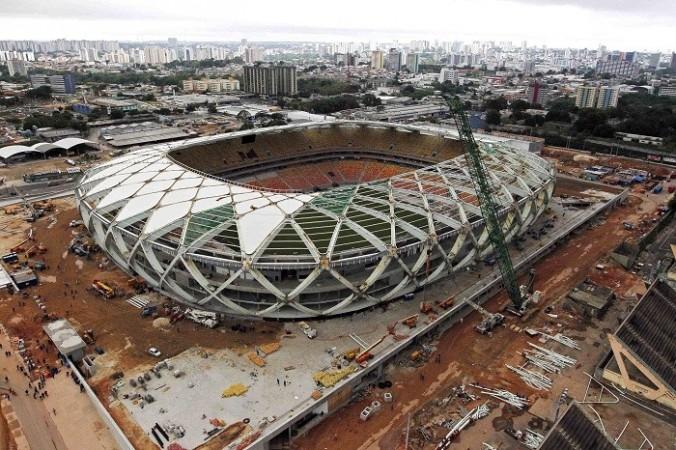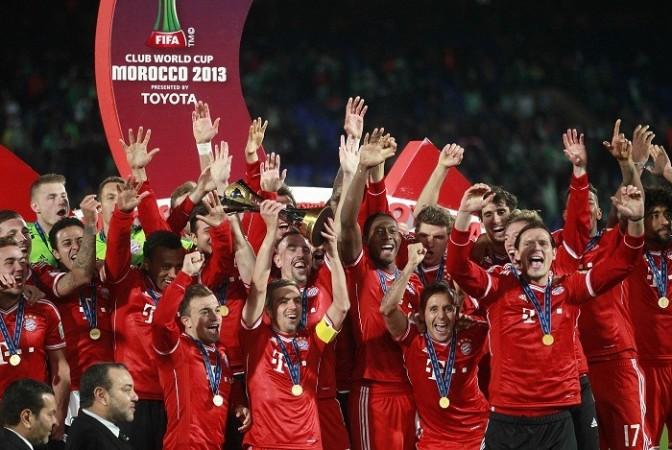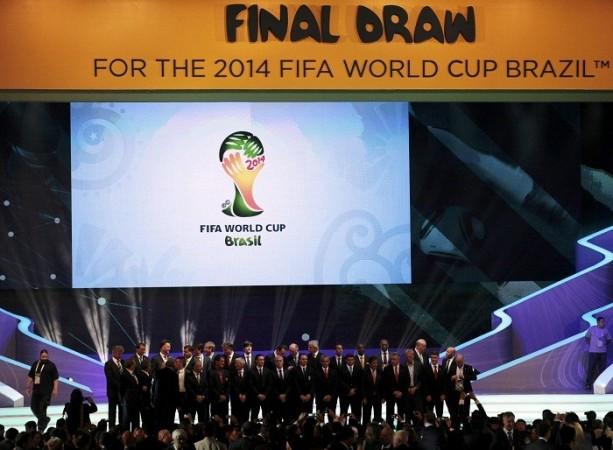
This year -- 2013 -- was the year of the B's as Brazil took centre-stage, sometimes for the wrong reasons, ahead of hosting the World Cup next year, while Bayern Munich dominated European club football, and with it ending the reign of another B - Barcelona -- as the we-don't-want-to-play-them European team.
With the 2014 World Cup on the horizon, all eyes turned to Brazil in 2013, with stadium delays, collapses, casualties and protests unfortunately marring the build up for football's premier event.
The 32 teams that will look to win that wonderfully glinting golden cup and the eight groups were drawn by FIFA late this year, but there are misgivings over whether some of the stadiums will even be ready to play in by June next year.
Workers have died during construction, while adding to the woes were protestors targeting the Confederations Cup, the traditional curtain raiser to the World Cup, held in June.
However, on the pitch it does look considerably rosy for Brazil, who are one of the favourites to lift the World Cup. Luiz Felipe Scolari is assembling a competent team capable of beating any team on their day and led by Brazil's new golden boy Neymar, who is making waves not only in his native land, but also in Europe after beginning the season in splendid fashion for new club Barcelona.
While Barca did win the Spanish league title yet again, in record fashion, they failed to stamp their authority on the European game, with Bayern Munich holding sway in terrific fashion.
Bayern's semifinal thrashing of Barca earlier this year was seen as a changing of guard of sort, with the German champions, who, of course also won the Bundesliga title as well as the German Cup last season, supreme, confident and near unbeatable.
Bayern also went on to add the UEFA Super Cup and the Club World Cup title to their kitty, with Pep Guardiola, who led Barcelona to world domination not too long ago, taking over from Jupp Heynckes and only seemingly making the well-oiled, unsurpassable machines even more dominant.

In the most popular league in the world, it was bitter sweet for Manchester United, who won the English Premier League title, but bid goodbye to their greatest ever manager - Sir Alex Ferguson, who decided to hang up his hairdryer after nearly 27 glorious, ridiculously trophy-filled years.
Ferguson is by far the most successful British manager of all-time, winning 49 trophies during his career, which includes a staggering 13 Premier League titles and two Champions League crowns.
David Moyes has been handed the reins at Old Trafford, and the fellow Scot has so far struggled to sashay away from the considerable shadow of his predecessor.
The Premier League also saw the return of the "Special One" Jose Mourinho, who came back for a second stint with his beloved Chelsea, with Ferguson's departure opening up the title race in England considerably. The likes of Arsene Wenger's Arsenal and Manchester City, along with Chelsea and Liverpool see this season as the perfect opportunity to take advantage of a struggling Manchester United side without their greatest ever manager.
Mourinho was replaced at Real Madrid, after the Portuguese failed to inspire the Spanish giants to either the La Liga title or the why-can't-we-just-win-it "La Decima", by Italian manager Carlo Ancelotti, who impressed during his time at cash-rich Paris Saint-Germain, taking them, with the inimitable Zlatan Ibrahimovic in tow, to the French league crown.
PSG will now also be remembered as the final club that one of football's most popular ever players played in, with David Beckham announcing his retirement at the end of last season. Beckham is now looking to invest in a new Major League Soccer club, with Miami thought to be the former England international's preferred base.

While the European leagues, which saw Juventus yet again come up trumps in the Serie A, will be the cynosure until next May, the attention, meanwhile, will slowly but surely start drifting back to the World Cup.
Spain will look to defend their title, although there have been signs of their dominance being on the wane. Germany, on the other hand, are seen as the European giant that could cause a flutter or three in Brazil as Joachim Low's exciting young side, filled with players from Bayern and Borussia Dortmund, target world domination and to become the first European side to win a World cup in South America.
Also in the mix will be Argentina, Brazil's great South American rivals, with Lionel Messi, named world player of the year for a fourth straight time at the start of 2013, looking to join the exalted company of the likes of Pele, Diego Maradona and Zinedine Zidane and with it cement his right to be called one of the greatest ever to kick a football.
Messi will of course have his greatest rival, Cristiano Ronaldo, who courtesy a stunning hat-trick single-handedly spurred Portugal to the World Cup finals in Brazil.
The battle for I'm-the-best-player-supremacy went into overdrive in year 2013, with Ronaldo seeming like he will take the yearend honours with his second Ballon d'Or.
The man that comes out smiling among the two after the World Cup next year will no doubt lift themselves to another bracket, but until then it will be the imaginations that will work overtime as the excitement surrounding the World Cup build up before reaching that I-can't-hear-anything-anymore crescendo.



!['He is done with the team now' : Angry Virat Kohli slams the bat, kicks the ground, yells at RCB team as SRH smashes runs [reactions] 'He is done with the team now' : Angry Virat Kohli slams the bat, kicks the ground, yells at RCB team as SRH smashes runs [reactions]](https://data1.ibtimes.co.in/en/full/796956/he-done-team-now-angry-virat-kohli-slams-bat-kicks-ground-yells-rcb-team-srh-smashes.jpg?w=220&h=135&l=50&t=40)











!['He is done with the team now' : Angry Virat Kohli slams the bat, kicks the ground, yells at RCB team as SRH smashes runs [reactions]](https://data1.ibtimes.co.in/en/full/796956/he-done-team-now-angry-virat-kohli-slams-bat-kicks-ground-yells-rcb-team-srh-smashes.jpg?w=220&h=135)

